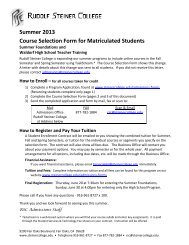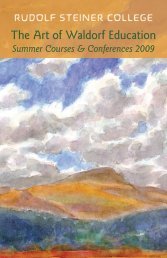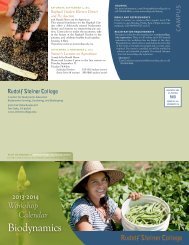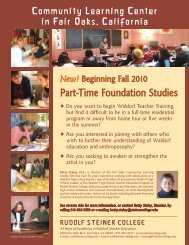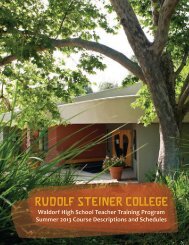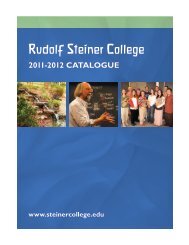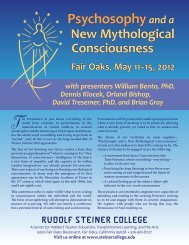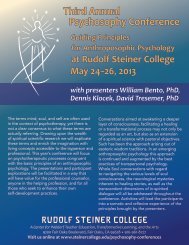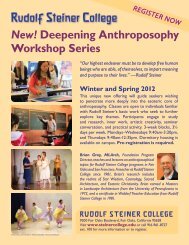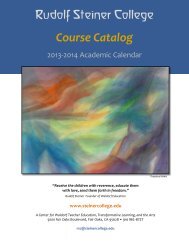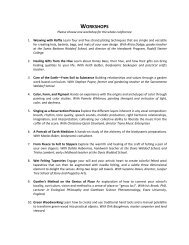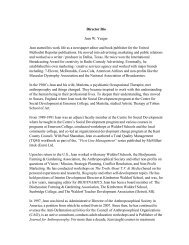Program Brochure - Rudolf Steiner College
Program Brochure - Rudolf Steiner College
Program Brochure - Rudolf Steiner College
You also want an ePaper? Increase the reach of your titles
YUMPU automatically turns print PDFs into web optimized ePapers that Google loves.
We aspire to a knowledge that is not only knowledge<br />
but also life and sentiment and which, from the<br />
moment it rises up into the human soul, develops the<br />
strength to live because it is transmuted into love.<br />
—<strong>Rudolf</strong> <strong>Steiner</strong><br />
Address to the opening of the first Waldorf school<br />
<strong>Rudolf</strong> <strong>Steiner</strong> <strong>College</strong><br />
A Center for Waldorf Teacher Education, Transformative Learning, and the Arts<br />
Main Campus: 9200 Fair Oaks Blvd, Fair Oaks, CA 95628 • 916-961-8727<br />
www.steinercollege.edu<br />
<strong>Rudolf</strong> <strong>Steiner</strong> <strong>College</strong> • San Francisco Campus<br />
2938 Washington Street, San Francisco, CA 94115<br />
sfprogram@steinercollege.edu • www.steinercollege.edu
<strong>Rudolf</strong> <strong>Steiner</strong> <strong>College</strong><br />
San Francisco Campus<br />
The San Francisco Waldorf Teacher Education <strong>Program</strong> is a<br />
three-year and three-summer part-time training specifically designed for those<br />
living and working in the greater San Francisco Bay Area. Emphasis is placed<br />
upon awakening the faculties of the teacher and developing his/her creativity in<br />
preparation for becoming a certified Waldorf teacher. Qualified graduates have<br />
the opportunity to apply to Waldorf schools world wide. Classes meet at the San<br />
Francisco Waldorf School on Friday evenings and Saturday mornings during<br />
the academic year and for three intensive weeks at the Fair Oaks campus each<br />
summer for three summers.<br />
<strong>Rudolf</strong> <strong>Steiner</strong> <strong>College</strong> is one of America’s leading centers for Waldorf<br />
teacher education and the study of anthroposophy. An important part of the<br />
college’s mission is bringing <strong>Rudolf</strong> <strong>Steiner</strong>’s new impulses leading to practical<br />
application in a variety of professions in the arts, sciences, and education.<br />
Anthroposophy is characterized by <strong>Rudolf</strong> <strong>Steiner</strong> as a science of the spirit;<br />
it is the philosophical and epistemological foundation of a renewal of science,<br />
art, and spiritual practice for the human being of our time and the possibility to<br />
transform his faculties of thinking, feeling, and willing in a holistic way.<br />
Waldorf Education<br />
Bring deeper meaning and perspective to your life...<br />
• Deepen your understanding of the human being and his destiny<br />
• Transform yourself into a creative artist<br />
• Learn to renew the art of education and carry this wisdom with<br />
you in everything you explore<br />
• Work with master teachers who share their expertise and insights<br />
while helping you develop classroom capacities and skills<br />
• Learn to fully integrate practical experience, academics, and the<br />
arts while exploring social and group dynamics with your<br />
classmates<br />
• Prepare to become a Waldorf teacher at the early childhood,<br />
grades, or high school level<br />
The need to experience again the truth, to experience again human<br />
community, to feel again stout-heartedness in the whole life of the<br />
spirit…This is what a voice within you asks.<br />
—<strong>Rudolf</strong> <strong>Steiner</strong>, The Younger Generation: I
The Teaching<br />
The San Francisco Teacher Education <strong>Program</strong> is a three-year<br />
transformative process building upon each level of learning, self-development,<br />
and discovery. The four main fields of development to deepen the experience of<br />
the art of teaching are:<br />
• Study of the Human Being, deepening the knowledge of the<br />
human and his relationship with the cosmos and world history<br />
• Developing a Phenomenological Epistemology, awakening<br />
new faculties of observation, imagination, and intuition through<br />
schooling of consciousness and inner work<br />
• Self-Transformation Through the Arts, developing creativity<br />
and reconnecting with one’s higher self<br />
• Pedagogy and Field Experience, renewing the art and science<br />
of teaching out of the knowledge of anthroposophy<br />
Each week of study in the academic year is expertly blended to balance and<br />
integrate these areas of development through three methods of learning:<br />
• Study, deepening one’s knowledge through reading books and<br />
discussing their content<br />
• Arts, re-enlivening the potential to learn creatively and<br />
intuitively<br />
• Seminars, dynamic and discussion-based learning through<br />
interaction with teachers and peers<br />
Sample Schedule<br />
Friday Evening<br />
7-7:25pm 7:30-8:30pm 8:35-10pm<br />
Year 1 Meeting Choir The Human Being and His Destiny<br />
Year 2 Meeting Choir Evolution of Consciousness<br />
through Art History<br />
Year 3 Meeting Choir Practical Advice to Teachers<br />
Saturday Morning<br />
8:30-9:25am 9:30-10:25am 10:30-11am 11-11:55am 12-1pm<br />
Year 1 The Human Being<br />
and His Destiny<br />
Year 2 Evolution of Consciousness<br />
through Art History<br />
Eurythmy Break Painting<br />
Break Eurythmy Music<br />
Year 3 Practical Advice to Teachers Break Music Eurythmy<br />
What the human being carries in his head will in time be lost. But<br />
what he receives into his heart, the heart preserves and carries into<br />
all spheres of activity in which the human being is involved.<br />
—<strong>Rudolf</strong> <strong>Steiner</strong>, The Younger Generation: XIII
A Look at the Classes<br />
Year One<br />
Foundation studies in anthroposophy, transformative and artistic disciplines, and<br />
a first approach to Waldorf pedagogy.<br />
Study of the Human Being<br />
• Nature of the Human Being and His Destiny: a phenomenological study<br />
of the human being through the lenses of body, soul, and spirit, followed<br />
by an overview of the idea of reincarnation and human destiny. Texts:<br />
<strong>Rudolf</strong> <strong>Steiner</strong>, Theosophy and Reincarnation and Karma.<br />
• <strong>Rudolf</strong> <strong>Steiner</strong>’s Life and Work: exploring <strong>Steiner</strong>’s biography as the<br />
expression of spirit in human life. Text: <strong>Rudolf</strong> <strong>Steiner</strong>, Autobiography.<br />
• Parzival by Wolfram von Eschenbach: the journey of the medieval hero<br />
Perceval, the one who has to pierce the vale of tears and darkness, as<br />
a metaphor for the modern search for man’s true being through stages of<br />
dullness and doubt to final spiritual awakening and love: a path of<br />
conscious transformation of the human soul.<br />
Developing a Phenomenological Epistemology:<br />
The Question of Knowing<br />
• From an intellectual knowing to a living, intuitive thinking, this is an<br />
introduction to anthroposophy as a new way of encountering nature and<br />
human beings as a foundation for ethical individualism and freedom.<br />
Texts: <strong>Rudolf</strong> <strong>Steiner</strong>, The Younger Generation, Philosophy of Freedom,<br />
and Knowledge of Higher Worlds.<br />
• Workshops in Goethean science in the garden of the main campus;<br />
a phenomenological approach to nature.<br />
Pedagogy and Field Experience<br />
• Introduction to Waldorf: Education and Child Development Texts:<br />
<strong>Rudolf</strong> <strong>Steiner</strong>, The Education of the Child and The Kingdom of Childhood.<br />
• Didactics: taught during the summer session, these classes discuss the<br />
why and how we teach grades 1-3. Language Arts (writing, reading,<br />
speech, grammar, and poetry), Mathematics (the world of numbers<br />
and forms), and Home Surroundings (the human being and nature) will<br />
be presented in an artistic and imaginative way with images which can<br />
grow with the child.<br />
• Field Experience: Seven days of observation in Waldorf classrooms.<br />
Students observe children at different stages of development from<br />
kindergarten through grade 12.<br />
Self-Transformation through the Arts<br />
• Speech and Storytelling • Eurythmy<br />
• Singing and Instrumental Music • Clay Modeling, Painting, and Drawing<br />
Students experience the transformative power of the visual arts through<br />
painting, drawing, form drawing, clay modeling, and handwork, and develop<br />
the skills necessary to each discipline. They also find transformative<br />
experiences in the performing arts as they delve into music, eurythmy,<br />
movement, speech, and storytelling.<br />
Year Two<br />
Going deeper into the knowledge of the human being as a becoming reality.<br />
Study of the Human Being<br />
• Biography and the Stages of Life: reading the book of one’s life.<br />
• Embryology: the mystery of birth.<br />
• The Human Being and the Cosmos: the question of evolution. Texts:<br />
<strong>Rudolf</strong> <strong>Steiner</strong>, Outline of Esoteric Science and Rosicrucian Wisdom.<br />
• History: reading the ‘book of history’ and learning to perceive the<br />
currents of forces active in the course of history. Text: <strong>Rudolf</strong> <strong>Steiner</strong>,<br />
From Symptom to Reality.<br />
• Evolution of Consciousness and Art History: contemplating and<br />
reproducing art works of the past and the present and learning to perceive<br />
within these works the expression of different aspects of the human soul.<br />
• The Human Being in His Essence: going further and deeper into the<br />
phenomenological study of the human being and his threefold reality of<br />
body, soul, and spirit. Text: <strong>Rudolf</strong> <strong>Steiner</strong>, Study of Man.
Year Two, continued<br />
Self-Transformation and Knowledge through the Arts<br />
• Speech and Drama • Eurythmy<br />
• Singing and Instrumental Music • Clay Modeling, Painting, and Drawing<br />
Continuing the practice of artistic disciplines to transform ourselves and<br />
develop a deeper understanding of the fourfold organism of the human being:<br />
physical, life, soul and I bodies. This is accomplished through modeling and<br />
sculpture, music and painting, speech, theater, and eurythmy for the<br />
harmony and unity of the four.<br />
Pedagogy and Field Experience<br />
• Didactics: out of a deeper knowledge of the human being and the<br />
stages of development of the child, here we discover how we can use<br />
pedagogical activities to support and offer guidance to the children.<br />
• What to bring in grades 4-5 when learning to read the ‘book of history’<br />
and the ‘book of nature’: the myths, legends, and cultures of humanity,<br />
reading, writing, grammar, and poetry on one side; geography, natural<br />
sciences, arithmetic, and geometry on the other.<br />
• In the early childhood track the fundamental question is the same; the<br />
difference lies in the how and the what one brings to the little children.<br />
• Field Experience: three full weeks of practice teaching in a Waldorf<br />
school in the kindergarten, grades, or high school level depending upon<br />
the student’s chosen track.<br />
We cannot become an educator through study. We cannot drill others<br />
into being educators… In each human being is an educator but this<br />
educator sleeps; he must be awakened and art is the awakener.<br />
—<strong>Rudolf</strong> <strong>Steiner</strong>, The Younger Generation: XI<br />
Year Three<br />
Going further and deeper into the art of education.<br />
Study of the Human Being<br />
• Study of Man: continuation of the study of the lectures given by <strong>Rudolf</strong><br />
<strong>Steiner</strong> to the circle of teachers at the founding of the first Waldorf school.<br />
• Child Study: developing phenomenological observation and perception<br />
of children where behavior and morphology will form a basis for an<br />
inquiry into the development of the human being.<br />
Pedagogy and Field Experience<br />
• The Architecture of the Teaching Plan: <strong>Rudolf</strong> <strong>Steiner</strong> has sketched<br />
different activities and situations that the teacher can use to awaken<br />
the consciousness of the children and their faculties. His teaching plan is<br />
the human being himself, offering the children an image of the reality<br />
they are growing towards.<br />
• Field Experience: a four-week internship under the guidance of an<br />
experienced teacher.<br />
• Didactics and Methodology: courses based upon the lectures given by<br />
<strong>Rudolf</strong> <strong>Steiner</strong> to the first group of Waldorf teachers will lead deeper<br />
into the knowledge and practice of the art of education with an emphasis<br />
on the upper grades 6-8. Texts: <strong>Rudolf</strong> <strong>Steiner</strong>, Practical Advice to<br />
Teachers and Discussions with Teachers.<br />
Teaching Arts and Self-Transformation<br />
• Modeling with children • Blackboard drawing<br />
• Singing with children • Playing different types of recorders<br />
• Speech, Poetry, and Theater<br />
The arts are now taught in a more pedagogical perspective. Experiences in<br />
eurythmy, painting, form drawing, choir, and theater continue to deepen the<br />
transformative process and the student’s relationship to art. It culminates in<br />
the production of a play for the community.
Testimonials<br />
<strong>Rudolf</strong> <strong>Steiner</strong> <strong>College</strong>’s weekend program ‘works’ on many levels: it joins a diverse<br />
student body with an excellent, experienced faculty, who together take up a<br />
thorough, broad and rich course of study. The weekend meetings make enrollment<br />
in the program possible for most working adults. James Finn, Alumnus, 2007<br />
At a point in my life when questions were sprouting up in the garden of my soul, the<br />
teachers, my peers, and the words of <strong>Steiner</strong> nurtured, listened to, and challenged me<br />
to probe deeper to find the source of my questions and also the answers to them. The<br />
Waldorf Teacher Training of <strong>Rudolf</strong> <strong>Steiner</strong> <strong>College</strong> in San Francisco, and now my<br />
work at a Waldorf School as a class Teacher, have deepened my inner life, enriched<br />
the artist and musician within, and encouraged the willful practice of healthy honest<br />
living, viewing, and serving the world. Susan Bolich, Alumna, 2006<br />
I enrolled in the San Francisco program not really knowing what to expect, and<br />
not even sure that I would consider being a classroom teacher. As the weekends<br />
progressed I quickly grew to love the program and I found myself looking forward<br />
more and more enthusiastically to meeting with my classmates and teachers each<br />
Friday evening. The teacher training became a joyful focus point for my life. It<br />
stimulated my artistic, intellectual, and philosophical practices. After three years,<br />
I feel very well-trained as a teacher, enriched as an individual, and very excited to<br />
professionally embark on the voyage of educating the children of today.<br />
Cale Brandley, Alumnus, 2010<br />
It is more important that pedagogical and didactic training be<br />
directed toward evolving the attitude…within the teacher’s soul. The<br />
primary focus of a teacher training should be the very heart of human<br />
nature itself. —<strong>Rudolf</strong> <strong>Steiner</strong>, The Essentials of Education: III<br />
The Faculty<br />
Irène François, <strong>Program</strong> Director<br />
Anthroposophical Studies, Faust and Parzival, Waldorf Pedagogy;<br />
Irène has been a Waldorf teacher at the elementary, high school,<br />
and teacher training levels since 1975. She has taught in several<br />
countries including France, Switzerland, Canada, and the<br />
United States. She holds a degree in East-West comparative<br />
philosophy from the University of Paris-Sorbonne and has been<br />
the director of the <strong>Rudolf</strong> <strong>Steiner</strong> Institute in Quebec since 1990.<br />
Karen Apana Anthroposophical Studies,<br />
Biography; San Francisco Waldorf High<br />
School<br />
Christiaan Boele Music, Choir; Singing<br />
Conferences and Workshops<br />
Paolo Carini Geometry; Math and Physics<br />
Teacher, San Francisco Waldorf High<br />
School<br />
Diane David Early Childhood; Lead<br />
Kindergarten Teacher, San Francisco<br />
Waldorf School<br />
Guillaume François Speech, Storytelling,<br />
and Theater; Freelance Director and<br />
Speech Artist<br />
Paul Gierlach History; Humanities<br />
Teacher, San Francisco Waldorf High<br />
School<br />
Brian Gray Cosmology; Foundations in<br />
Anthroposophy <strong>Program</strong> Director, <strong>Rudolf</strong><br />
<strong>Steiner</strong> <strong>College</strong><br />
Contact Us<br />
Bodo Langen Clay Modeling,<br />
Coppersmithing; Art Teacher, Santa Cruz<br />
Waldorf School<br />
Ted Mahle Painting, Drawing, Art History;<br />
Art Teacher, <strong>Rudolf</strong> <strong>Steiner</strong> <strong>College</strong><br />
Robert McDermott <strong>Rudolf</strong> <strong>Steiner</strong> and<br />
others; Professor, California Institute of<br />
Integral Studies<br />
Anna Rainville Singing Games; Freelance<br />
Artist<br />
Mark-Daniel Schmid Instrumental Music;<br />
Music, Peninsula Waldorf High School<br />
Isabelle Tabacot Pedagogical Studies;<br />
Class Teacher, Sacramento Waldorf School<br />
Astrid Thiersch-Weber Eurythmy;<br />
Eurythmy Teacher, San Francisco Waldorf<br />
High School<br />
David Weber Choir, Pedagogical Studies;<br />
San Francisco Waldorf High School<br />
For more information call Irène François, <strong>Program</strong> Director, at 415-751-2855,<br />
e-mail us at sfprogram@steinercollege.edu, or visit us on Facebook by searching<br />
<strong>Rudolf</strong> <strong>Steiner</strong> <strong>College</strong> San Francisco.<br />
For information about Admissions, Tuition and Fees, and Financial Assistance,<br />
call 916-961-8727 ext. 100 or visit www.steinercollege.edu (click on Admissions).



